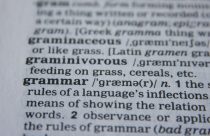When to Use “e.g.” and “i.e.” While Writing Your Paper

We see them often in text, usually in parentheses, and we can usually figure out the context from the text before them, but what do those letters mean? The abbreviation “e.g.” stands for the Latin exempli gratia, which means “for example” or “for the sake of example.” The abbreviation “i.e.” stands for the Latin phrase id est, which means “that is to say” or “in other words.” When writing, we often use these terms like examples (e.g.) to emphasize a point or use (i.e.) to state the point in a different way without a long explanation.
Some confuse the two terms and use them incorrectly. The following will provide you with some helpful hints and examples.
E.g. vs. i.e.–What’s the Difference?
As stated above, e.g. is short for “for example.” The easiest way to remember this one is that it starts with an “e” and so does “example.” Here’s how to use for example (e.g.) in a sentence:
“There are many types of trees (e.g., spruce, oak, maple) in the study area.”
“There were several breeds of horse (e.g., Thoroughbreds, Appaloosas, Paints) at the barn where we conducted our study on West Nile Virus.”
Note that by providing a few names as examples, we imply that there are many more than just these three trees or these three breeds of horse.
If these three trees or horse breeds were the only ones in those settings, the sentences would instead read:
“There are many spruce, oak, and maple trees in the study area.”
“There are Thoroughbreds, Appaloosas, and Paints at the barn where we conducted our study on West Nile Virus.”
Related: Finished preparing your manuscript? Check out these additional points now before submitting your manuscript
Remembering the abbreviation i.e. is just as easy. It begins with an “i” and so does the first word in its meaning—“in other words.” Here’s how to use i.e. in a sentence:
“After work, I’m going to try the new restaurant (i.e., All About Pasta) to decide on a venue for the reception.”
“To buy the car that I really want (i.e., a Tesla), I will have to work a lot of overtime.”
It might also help you remember the differences if you think of the two abbreviations this way: e.g. provides examples so it tends to increase the number of options, while i.e. provides clarification or precise information so that it tends to narrow down the number of options.
Punctuation and Style
Correct punctuation of abbreviations is also important. For these two abbreviations, the punctuation is fairly simple, although there are some exceptions (as noted). Some of the rules of punctuation for these two abbreviations are as follows:
- Use lowercase letters unless at the beginning of a sentence (very rare) and then capitalize only the first letter. It would be best to not use an abbreviation to begin a sentence. Instead, write out the phrase it stands for, such as “for example,” or “in other words,” to begin the sentence.
- Place a period after each letter.
- Place a comma after the second period (note: in British English, no commas are used).
- Do not italicize even though they are abbreviated Latin terms; however, note that some author guidelines specify that all foreign words and phrases be italicized. In scientific writing, we often see phrases such as “in vitro” italicized as well as these abbreviations. Be sure to check your guidelines.
- Place the phrase either in parentheses or within the sentence itself. This is a matter of preferred style. Most scientific writings place the phrases inside parentheses, and the Chicago Manual of Style, which is used for all prose and poetry and in many of the liberal arts fields of discipline, specifies that they always be inside parentheses.
Different disciplines use different style guides that have their own rules of punctuation for these and other abbreviations. Generally, the above points should be followed in most cases in academic writing. Abbreviations are fairly standardized across all disciplines; however, always be sure to check your author guidelines and style guides for specific discipline for any exceptions to these rules.
Have you faced any problems while using e.g. or i.e.? What tips did you follow? Share with us in the comments section!
Frequently Asked Questions
"E.g." is an abbreviation that stands for "exempli gratia," which is Latin for "for example." It is used to introduce one or more examples that illustrate or represent the general statement being made.
"I.e." stands for the Latin phrase "id est", which translates to "that is" in English. It is used to clarify or explain something further by providing an alternative or more specific wording. When you use "i.e.," you are essentially saying "in other words" or "more precisely."
Use "e.g." when you want to provide one or more examples that represent a general statement or category. It implies that the examples given are not an exhaustive list. Use "i.e." when you want to clarify or provide an alternative wording for something that has been mentioned before. It offers further explanation or rephrasing.
"E.g." and "i.e." are both abbreviations that serve different purposes. "I.e." is used to provide further explanation, clarification, or rephrasing of something mentioned previously.
Example: "I have only one goal this year, i.e., to save enough money for a trip around the world.""E.g." is used to introduce one or more examples that represent a broader category or concept.
Example: "She enjoys outdoor activities, e.g., hiking, swimming, and cycling."
The abbreviation "e.g." stands for the Latin exempli gratia, which means "for example" or "for the sake of example."
The abbreviation "i.e." stands for the Latin phrase id est, which means "that is to say” or "in other words."










This post clarified all my life now. I used to struggle and misunderstand every time I read those abbreviations but now, after that amazing explanation, I feel like I finally learn! Thank you so much!!!!
Is ‘i.e.’ used in past tense too?
For example,
I was wondering what e.g. stood for. I had to go to another page. E.g. stands for exempli gratia and means “for example.” Otherwise, easy to understand and helpful. That is also an example of using it in the beginning of a sentence. Thank you for this article.
It is helpful to me thank you
A fascinating discussion is definitely worth comment. I believe
that you should write more on this topic, it
might not be a taboo subject but usually folks don’t talk about
such subjects. To the next! Best wishes!!
It helped me a lot, I’ve been wondering why it’s not e.x. but e.g. for a long time as well as many around.